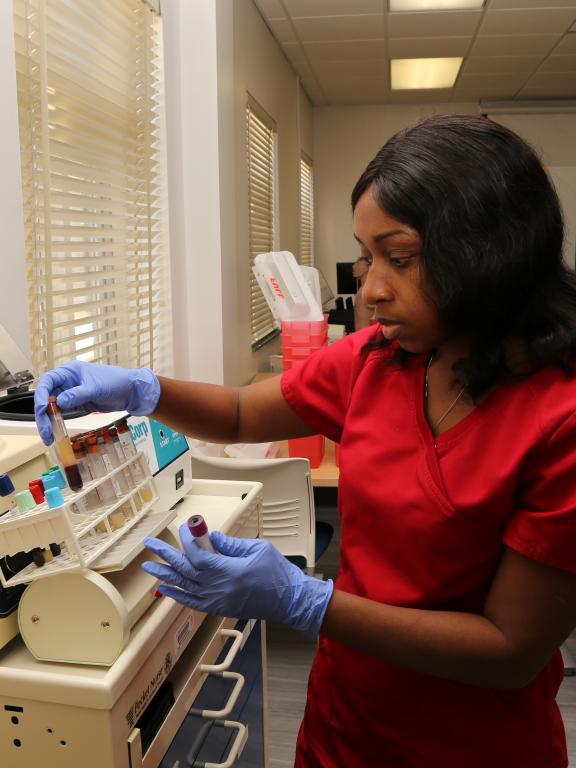Phlebotomy school: Career Pathways
Phlebotomy school: Career Pathways
Blog Article
The Path to Certification: Comprehending the Phlebotomy Training Training Course Trip and Its Importance
As you consider the path to accreditation in phlebotomy, it's essential to comprehend the function you'll play in medical care. Your training will certainly cover essential skills, from blood collection strategies to patient interaction. Each part of the program prepares you for the challenges ahead. What specifically does the journey require, and why is certification so critical for your future profession? Allow's explore these concerns additionally.

The Role of Phlebotomists in Health Care
Phlebotomists play a necessary role in the health care system, functioning as the important link between individuals and vital diagnostic testing. You'll carry out blood draws, making sure examples are collected precisely and safely. Your experience aids in diagnosing medical problems, checking wellness, and leading therapy choices.
In your daily interactions, you'll require to develop trust fund with individuals, making them really feel comfy throughout what might be a demanding experience. You're accountable for identifying and handling samples carefully to avoid contamination or mistakes, which could affect examination outcomes.
Past this, you'll usually function alongside doctors and nurses, communicating vital details concerning patients' conditions. By mastering your skills, you add meaningfully to person treatment, making you an indispensable component of the clinical group.
Introduction of Phlebotomy Training Programs
When discovering phlebotomy training programs, you'll locate different types developed to fit different schedules and learning designs. Each program aids you establish necessary skills like blood collection and individual interaction. Understanding these alternatives is crucial to selecting the best path for your job.
Sorts Of Training Programs
Several types of training programs are readily available for those looking to end up being proficient in phlebotomy. Additionally, some health centers and clinics use on-the-job training programs, giving practical experience while you find out. Whatever path you select, each program aims to equip you with the necessary skills for a successful phlebotomy career.

Trick Skills Developed
Grasping phlebotomy calls for a collection of key skills that are developed through complete training programs. You'll find out technological abilities like correct blood vessel option, needle insertion, and blood collection strategies. These hands-on techniques guarantee you can perform procedures securely and efficiently. Additionally, communication skills are fundamental; you'll need to interact with patients, explain procedures, and placed them at convenience. Recognizing makeup and physiology is essential, also, as it aids you find capillaries and comprehend the body's reaction to blood draws. You'll obtain expertise of safety and security procedures and infection control, guaranteeing you maintain a clean and sterile setting. Each of these skills is important for your success as a certified phlebotomist, making you a valuable property in any type of healthcare setup.
Secret Components of a Phlebotomy Program
In a phlebotomy course, you'll concentrate on essential subjects that lay the groundwork for your future occupation. You'll involve in hands-on training that enables you to use what you've discovered in real-world setups. Both the curriculum and functional experience are vital for your success as a phlebotomist.
Core Educational Program Overview
While going after a phlebotomy training program, you'll encounter a core curriculum made to equip you with fundamental abilities and expertise. Phlebotomy school. This curriculum usually consists of makeup and physiology, concentrating on the circulatory system and recognizing blood parts. You'll also discover around various kinds of blood collection methods, including venipuncture and capillary puncture methods
In addition, infection control and safety and security protocols are important elements, guaranteeing you understand just how to keep a sterile environment. You'll study patient interaction, emphasizing communication and empathy, which are vital for alleviating person anxiousness. Ethical and legal considerations will be addressed, preparing you for real-world responsibilities. This fundamental expertise will certainly allow you to stand out as a phlebotomist and supply high quality care in medical settings.
Hands-On Training Experience
Getting hands-on experience is an essential component of your phlebotomy training program. This useful training allows you to use what you've learned in a real-world setup, improving your skills and self-confidence. You'll exercise venipuncture techniques, find out just how to deal with different kinds of specimens, and obtain aware of the devices used in the area. Under the assistance of experienced teachers, you'll fine-tune your abilities, ensuring you're prepared for any kind of circumstance you could deal with.
Additionally, you'll obtain the possibility to connect with individuals, which is important for creating your communication skills. This mix of technical effectiveness and interpersonal skills is critical for your success as a licensed phlebotomist. Ultimately, hands-on training is where concept meets method, strengthening your knowledge and readiness for certification.
Accreditation and Licensing Needs
Before you can start your job in phlebotomy, it is vital to comprehend the qualification and licensing requirements that vary by state. The majority of states require phlebotomists to hold an accreditation from an acknowledged organization, such as the National Phlebotomy Association or the American Culture for Professional Pathology. These certifications usually entail passing a test that tests your knowledge and skills in the field.
Along with accreditation, some states have certain licensing needs. You might require to finish a particular variety of hours in clinical practice, submit proof of training, or undergo a background check. It is essential to research your state's policies to ensure you satisfy all required requirements.
Remaining notified regarding these demands not only helps you secure a position but also enhances your reliability as a professional. By fulfilling these requirements, you'll be i loved this well on your means to an effective occupation in phlebotomy.
Hands-On Training and Practical Experience
Hands-on training and functional experience are necessary elements of your phlebotomy education, as they enable you to apply academic expertise in real-world scenarios. Throughout your training, you'll engage in supervised venipuncture, learn correct strategies, and come to be aware of various blood collection equipment. This straight participation is important for developing your confidence and honing your abilities.
You'll function carefully with skilled experts that can guide you through the subtleties of individual interaction and example handling. Each session not just enhances your understanding however additionally prepares you for the fast-paced atmosphere of health care settings.
Furthermore, several programs include medical rotations, enabling you to experience diverse setups, from medical facilities to outpatient clinics. This direct exposure helps you adjust to different difficulties and patient requirements, ensuring you're well-prepared for your future function. Welcome these chances, as they're vital to coming to be a proficient and compassionate phlebotomist.
Difficulties Encountered During Training
While acquiring hands-on experience is necessary, it's important to recognize the difficulties that can develop throughout your phlebotomy training. In addition, mastering the skills required for blood draws takes method; you might battle with strategy originally.
Time management can also be a hurdle, as balancing theory, functional sessions, and individual dedications can feel challenging. try this website You may deal with differing finding out rates among your peers, resulting in feelings of insecurity if you assume you're falling back. Ultimately, adjusting to the various personalities of trainers can be difficult, as each might have an unique teaching style.
Identifying these challenges beforehand can prepare you for success and assist you establish durability throughout your training journey.
Career Opportunities After Certification

As you obtain experience, you may also consider concentrating on areas like pediatric or senior citizen phlebotomy, providing to certain patient requirements. Some phlebotomists pick to advance their jobs by ending up being research laboratory specialists or seeking further education in medical care fields.
Furthermore, your qualification can result in functions in training or supervising new phlebotomists, read the full info here permitting you to share your knowledge. With the health care sector continually growing, your skills will certainly constantly be in demand, leading the means for a stable and satisfying occupation. Welcome the opportunities waiting on you!
Regularly Asked Inquiries
What Is the Typical Period of a Phlebotomy Educating Training Course?
Phlebotomy training programs generally last around four to 8 weeks. You'll participate in hands-on practice, class guideline, and on-line discovering. Finishing this training prepares you for qualification and a gratifying occupation in health care.
Are Online Phlebotomy Courses Available?
Yes, on-line phlebotomy courses are offered. They offer flexibility and benefit, allowing you to examine at your own speed. Just verify the program is certified to satisfy qualification demands and acquire valuable abilities for your occupation.
Just How Much Does Phlebotomy Training Typically Price?
Phlebotomy training normally costs in between $700 and $2,500, depending upon the program and location. You must consider variables like program size, included products, and hands-on experience when picking the ideal training for you.
What Prevail Requirements for Phlebotomy Training?
Usual prerequisites for phlebotomy training typically consist of a high school diploma or GED, immunizations, and a history check. Some programs might also need standard healthcare understanding or qualifications, ensuring you're gotten ready for hands-on training.
Can I Function While Finishing My Phlebotomy Training?
Yes, you can work while finishing your phlebotomy training. Several students balance tasks with their studies, yet make sure to handle your time successfully to guarantee you satisfy both job and training commitments efficiently.
Report this page